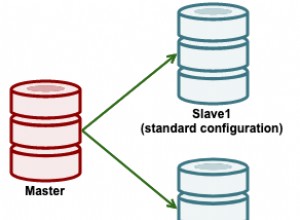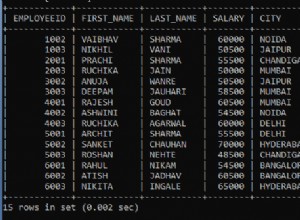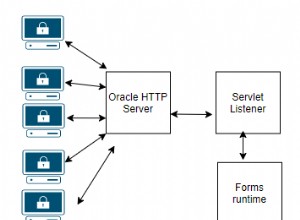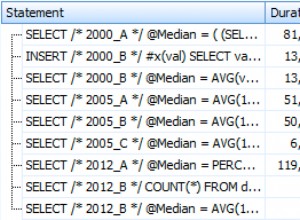यदि आप अपने डेटाबेस में अधिक नियमित अभिव्यक्ति शक्ति चाहते हैं, तो आप LIB_MYSQLUDF_PREG का उपयोग करने पर विचार कर सकते हैं। . यह MySQL यूजर फंक्शंस का एक ओपन सोर्स लाइब्रेरी है जो PCRE लाइब्रेरी को इम्पोर्ट करता है। LIB_MYSQLUDF_PREG केवल सोर्स कोड फॉर्म में डिलीवर किया जाता है। इसका उपयोग करने के लिए, आपको इसे संकलित करने और इसे अपने MySQL सर्वर में स्थापित करने में सक्षम होना चाहिए। इस पुस्तकालय को स्थापित करने से MySQL का अंतर्निहित रेगेक्स समर्थन किसी भी तरह से नहीं बदलता है। यह केवल निम्नलिखित अतिरिक्त कार्य उपलब्ध कराता है:
PREG_CAPTURE एक स्ट्रिंग से एक रेगेक्स मैच निकालता है। PREG_POSITION वह स्थिति देता है जिस पर एक नियमित अभिव्यक्ति एक स्ट्रिंग से मेल खाती है। PREG_REPLACE एक स्ट्रिंग पर खोज और प्रतिस्थापन करता है। PREG_RLIKE परीक्षण करता है कि रेगेक्स एक स्ट्रिंग से मेल खाता है या नहीं।
ये सभी कार्य अपने पहले पैरामीटर के रूप में नियमित अभिव्यक्ति लेते हैं। यह रेगुलर एक्सप्रेशन पर्ल रेगुलर एक्सप्रेशन ऑपरेटर की तरह स्वरूपित होना चाहिए। उदा. यह जांचने के लिए कि क्या रेगेक्स विषय मामले से असंवेदनशील रूप से मेल खाता है, आप MySQL कोड PREG_RLIKE('/regex/i', विषय) का उपयोग करेंगे। यह PHP के preg फ़ंक्शन के समान है, जिसके लिए PHP स्ट्रिंग के अंदर रेगुलर एक्सप्रेशन के लिए अतिरिक्त // सीमांकक की भी आवश्यकता होती है।
यदि आप कुछ अधिक सरल चाहते हैं, तो आप अपनी आवश्यकताओं के अनुसार बेहतर ढंग से इस फ़ंक्शन को बदल सकते हैं।
CREATE FUNCTION REGEXP_EXTRACT(string TEXT, exp TEXT)
-- Extract the first longest string that matches the regular expression
-- If the string is 'ABCD', check all strings and see what matches: 'ABCD', 'ABC', 'AB', 'A', 'BCD', 'BC', 'B', 'CD', 'C', 'D'
-- It's not smart enough to handle things like (A)|(BCD) correctly in that it will return the whole string, not just the matching token.
RETURNS TEXT
DETERMINISTIC
BEGIN
DECLARE s INT DEFAULT 1;
DECLARE e INT;
DECLARE adjustStart TINYINT DEFAULT 1;
DECLARE adjustEnd TINYINT DEFAULT 1;
-- Because REGEXP matches anywhere in the string, and we only want the part that matches, adjust the expression to add '^' and '$'
-- Of course, if those are already there, don't add them, but change the method of extraction accordingly.
IF LEFT(exp, 1) = '^' THEN
SET adjustStart = 0;
ELSE
SET exp = CONCAT('^', exp);
END IF;
IF RIGHT(exp, 1) = '$' THEN
SET adjustEnd = 0;
ELSE
SET exp = CONCAT(exp, '$');
END IF;
-- Loop through the string, moving the end pointer back towards the start pointer, then advance the start pointer and repeat
-- Bail out of the loops early if the original expression started with '^' or ended with '$', since that means the pointers can't move
WHILE (s <= LENGTH(string)) DO
SET e = LENGTH(string);
WHILE (e >= s) DO
IF SUBSTRING(string, s, e) REGEXP exp THEN
RETURN SUBSTRING(string, s, e);
END IF;
IF adjustEnd THEN
SET e = e - 1;
ELSE
SET e = s - 1; -- ugh, such a hack to end it early
END IF;
END WHILE;
IF adjustStart THEN
SET s = s + 1;
ELSE
SET s = LENGTH(string) + 1; -- ugh, such a hack to end it early
END IF;
END WHILE;
RETURN NULL;
END




